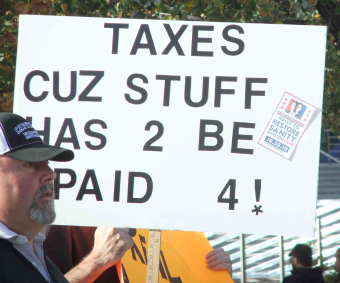Some Perspective on the Illinois Tax Increase
By Kevin Robinson in News on Jan 19, 2011 2:00PM
A lot of hay has been made in the press about the recent tax increase in Illinois, especially from our neighbors to the North in Wisconsin, where the newly-elected governor is anxious to prove that the taxing ways of Illinois Democrats will lead to our state's demise. Even Indiana's gotten into the act, with the mayor of Indianapolis running full page ads in the Chicago Tribune and the Peoria Star Journal encouraging businesses to relocate East to take advantage of what's advertised as a more favorable tax rate. Illinois's elected officials haven't helped the situation, either, passing the tax increase without doing much to frame the issue.
Yesterday Eric Zorn ran a fact sheet published by Governor Pat Quinn's office, contrasting our income tax rate with that of other Midwestern states:
Personal Income TaxIllinois’ new, temporary income tax rate is not out line with other Midwest states. In fact, our income tax rate was out of line (far too low) before the recent revenue increase. For example:
Wisconsin taxes nearly all income earners at a rate higher than Illinois:
- If one makes over $13,620 per year, their tax rate starts at 6.15%;
- Rate goes up to 6.5% for those making over $27,000 per year;
- Rate is up to 6.75% for high income earners.
Indiana’s base state rate is lower than Illinois (3.4% to 5%), but Indiana counties are also allowed to add up to another 3.1% onto that base rate; all but one (county) chooses to do so.
- Residents of the Indianapolis metro area - the largest population center in Indiana - are taxed at a higher rate than Illinois once Marion County tax is added.
- Residents of Benton Co, IN (just east of Kankakee Co, IL) pay an additional 2.29%, bringing their income tax total to 5.69%.
- Just to the north in Jasper Co, IN, individuals pay 6.45%, after that county imposes a 3.04% rate on top of the state income tax.
- Rates around the region are similarly equal to or higher than Illinois new temporary income tax rate. Only Michigan will have a lower rate (4.35%), but that is only for the next four years (when our rate will again drop far below that level - 3.75%).
- At the completion of this 14 year plan, Illinois’ 3.25% personal income tax rate will again be - by far - the lowest in the Midwest.
- Illinois’ structural deficit stems, in part, from its low revenue levels. For years we have functionally taxed at half the rate of our neighbor, Wisconsin - and far below the rates of all our other neighbors.
Corporate Income Tax
While the corporate income tax in Illinois will rise to 7% on a temporary basis, companies that do business in the state of Illinois are taxed on profits from the location of their customers - not the physical location of the business. Moving across the state border will not affect a business’s Illinois income tax bill. For example:
- The only way for the company to avoid paying Illinois corporate tax is for the company to cease selling their product to Illinoisans; relocating out of Illinois will have no effect on the amount of money paid by a company to the State of Illinois.
- A company that has $1 million in profits from $10 million in sales - $4 million of which was generated by sales in Illinois - will pay the same amount in income taxes ($28,000 under the 7% rate) whether they are located in Illinois, Wisconsin, Indiana, or even Montana.
Zorn goes on to detail some of what the governor's office is touting as cost-saving measures, including a two percent spending growth cap and other reductions in spending, including pension, benefit and payroll cuts and staff reductions for state employees, reductions in state spending and contracts and cuts to public health, education and arts grants.
There are two key facts that are not brought up during discussions of the tax increase in Illinois. The first is one made by Rich Miller last week, which is that the major bond houses on Wall Street have effectively told Illinois that if it doesn't deal with its deficit, the state won't be able to borrow money at a reasonable rate in the foreseeable future. Without massive spending cuts on a magnitude that would probably be unpalatable to most Illinoisans, a tax increase was unavoidable.
The other is that for working people in the state, much of the tax increase will be offset by the federal payroll tax holiday. As part of the tax deal brokered by President Obama with congressional Republicans during the lame duck session, workers saw their contribution to Social Security reduced by two percent. That should offset some if not all of the state tax increase. What that means for the long-term viability of Social Security is another debate, one that taxpayers in our state haven't been up in arms about.
